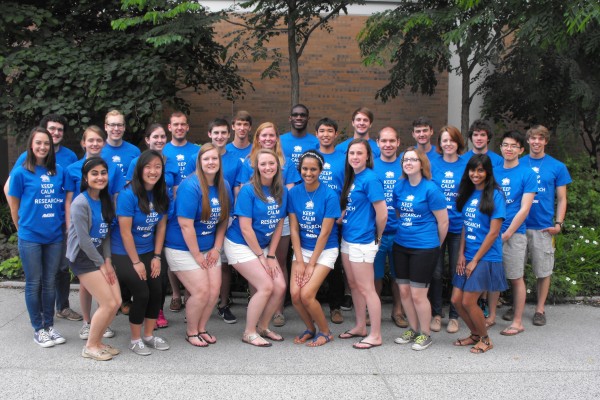Wash U Expert: Supreme Court case against Affordable Care Act has no merit
The U.S. Supreme Court has agreed to hear a lawsuit targeting federal subsidies designed to help millions of Americans afford health insurance. The case is dubious on its merits, says Timothy D. McBride,
PhD, professor at Washington University in St. Louis’ Brown School and
a noted health economist, citing legal precedent as reason for allowing the subsidies to continue.
Washington University receives new grant to host Amgen Scholars Program
Washington University in St. Louis has been awarded a grant from the Amgen Foundation that will provide hands-on laboratory experience to undergraduate students through the Amgen Scholars Program. This marks the fifth year that Washington University is participating in the program.
The cat’s meow: Genome reveals clues to domestication
Cats and humans have shared the same households for at least 9,000 years, but we still know very little about how our feline friends became domesticated. An analysis of the cat genome by School of Medicine researchers reveals some surprising clues. Pictured is a blue Abyssinian cat.
Zazulia to oversee continuing medical education
Allyson R. Zazulia, MD, is the new associate dean for continuing medical education (CME) at the School of Medicine. In her new role, Zazulia will oversee and administer learning opportunities for practicing physicians. This includes maintaining accreditation and developing new CME programs.
Budding entrepreneurs: Apply now for Bear Cub grants
Washington University’s Bear Cub grant program helps researchers make the leap from bench scientists to budding entrepreneurs. The application deadline is Nov. 30.
When I’m 64: Imagining the future of aging
Today’s freshmen students have a 50 percent chance of living to see their 100th birthdays. They are in the middle of a demographic revolution that will shape every aspect of their lives. A new interdisciplinary course for freshmen introduced this fall, “When I’m Sixty-Four: Transforming Your Future,”
aims to prepare students for this aging revolution and to encourage
them to examine their present and future lives in more detail.
New center aims to use gut microbiome discoveries to improve human nutrition
A new center at the School of Medicine aims to tackle the challenges of feeding the world’s rapidly expanding population and improving global health by linking efforts to develop more nutritious foods with discoveries gleaned from the gut microbiome.
New funding speeds identification of drugs to prevent Alzheimer’s
The National Institutes of Health (NIH) has boosted
funding for the first large-scale clinical trial aimed at identifying
drugs to stop or slow Alzheimer’s disease in people who are destined to
get it. The trial is led by Randall Bateman, MD.
Medical errors drop with improved communication during hospital shift changes
Improved communication among health-care providers during shift changes reduced injuries due to medical errors by 30 percent, according to a multicenter study. The research involved St. Louis Children’s Hospital and eight other academic medical centers. Pictured is study co-author F. Sessions Cole, MD, and attending physician Amanda Emke, MD.
Washington University responds to Ebola threat
Efforts at Washington University and Barnes-Jewish and St. Louis Children’s hospitals to safely coordinate a response to the Ebola virus have been underway for several months. Among those efforts are suggested steps for faculty, staff and students traveling to and from Ebola-stricken countries.
Older Stories

